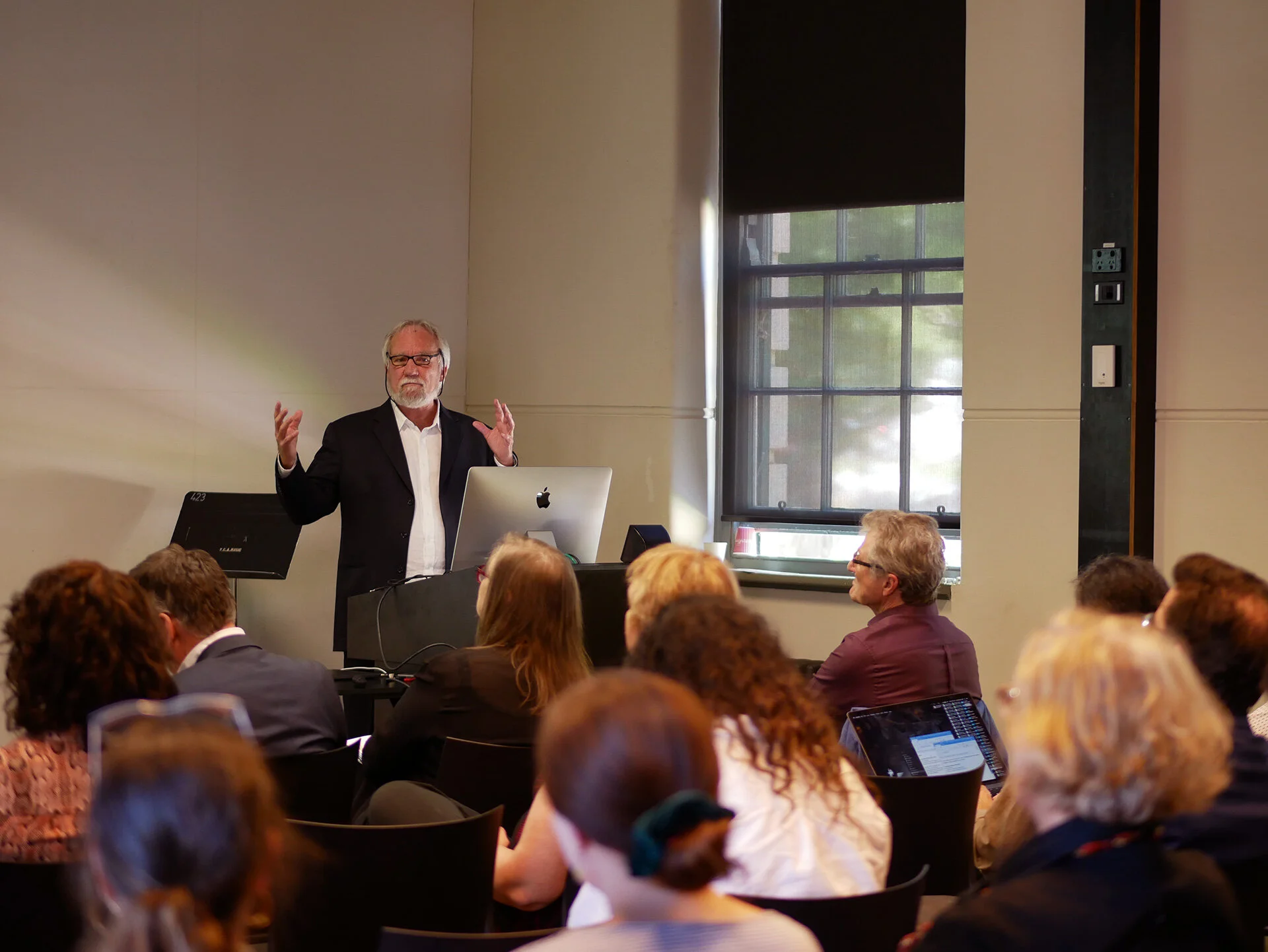30 October saw perhaps the largest gathering of tertiary creative arts leadership in DDCA’s history, all brought together around the topics of teaching and graduate employability and measurement and assessment in creative arts research. This year’s event was kindly sponsored by UniSuper Ltd.

Professor Clive Barstow welcomes attendees and shows the exitS to any potential troublemakers
The Forum opened with a welcome to country and venue by Victorian College of the Arts Director Professor Jon Cattapan, who also acknowledged and introduced Professor Richard Kurth, the new Director of the Melbourne Conservatorium.
In his first DDCA event as President, Professor Clive Barstow welcomed attendees and, after a short description of the day ahead, introduced Professor Dawn Bennett as the first speaker on the topic of graduate employability.
Dawn’s presentation drew upon her own research which highlighted how the ‘bad news’ about creative art graduate employment data shifted depending upon the criteria that was selected. The majority of media reports rely upon ‘successful’ employment being full time – where creative arts disciplines recorded lower figures. However when the definition of ‘success’ included part time and self employment, creative arts moved up to the top five in terms of disciplines with the highest percentage of graduate ‘employment’. Arguing that ‘employability’ and ‘work’ are far more accurate terms than just ‘employment’ and ‘jobs’, Dawn challenged some of the widely held perceptions about creative arts work and generously shared a number of resources developed as part of her Developing Employability project.
Professor Russell Tytler then took up the subject, presenting some of the key findings from the 100 Jobs of the Future project undertaken by The Ford Foundation, Deakin and Griffith universities. Highlighting some fascinating new jobs such as fusionist, nostalgist and multisensory experience designer, and presenting case study projects, Russell showed how creativity represented a central skill for future work.
These presentations set the scene for audience discussion and deeper reflection on the issue of graduate employment and employability.

Professor Dawn Bennett gives the real scoop on creative arts ‘employability’

Professor Russell Tytler presents the Jobs of the Future

Discussion with Professors Bennett and Tytler
The DDCA AGM was held just before lunch and included the election of a new DDCA board member. After four years as part of the DDCA Executive, Professor Julian Goddard from RMIT has decided not to seek reelection next year. After a paper ballot of members attending, Associate Professor Kim Cunio, Head of ANU Music School, was welcomed to the board. We would like to take this opportunity to thank Julian for his wisdom and input to both DDCA and NiTRO, and we look forward to Kim’s contribution to our future success.
After lunch, discussion turned to research, specifically its measurement and assessment within the current management and funding environment. Professors Ross Woodrow and Paul Gough, both regular DDCA and NiTRO contributors, brought complementary aspects of the topic to the discussion. Ross outlined the need for sector agreement on how we determine whether a piece of work should be considered as a major, minor or portfolio output using examples to ask how the audience would ‘assess’ them. To illustrate his point, the audience vote was duly split. He further discussed how scope and scale fit within the assessment process reminding us that ‘the answer is not necessarily, if ever, in the research statement and each case must be taken on its own merits’.
Paul turned to the lessons that could be drawn from the ERA Impact and Engagement assessment exercise noting that strong previous ERA performance did not necessarily equate with strong performance in impact and engagement. He identified some of the different features between low and high rated assessments in engagement and impact and considered what role research centres can play in this environment. He ended with some practical questions to guide future submissions.

Professor Ross Woodrow engages attendees with AN ETHICAL dilemma

Professor Paul Gough argues that era performance does not necessarily mean engagement
As with the morning session, the audience discussion was lively and brought out some interesting examples and ideas.
The day drew to a close with a discussion of what activities and priorities DDCA could take forward on behalf of its members. The list was long and wide-ranging! The next task for the DDCA executive will be to consider what, given our limited budget, we can pursue over the next 12–24 months, whether alone or in collaboration with individual member universities or other peak bodies. DDCA will update on this in early 2020.
For those wishing to ‘kick on’ Jon Cattapan and Richard Kurth took delegates for a tour of the new music and visual arts facilities at the campus.
NiTRO took the opportunity to get some feedback from attendees about the event, DDCA and NiTRO. Some of the stand outs for me include the observation that ‘NiTRO is frightening the s*** out of university management’ and that the event brought the ‘feeling of being with my own people’. Griffith Film School’s Professor Trish FitzSimons summed up the general audience views of the day: ‘Terrific stimulating speakers indeed, on both the teaching and the research dimensions of our shared agendas across the various DDCA member schools.’
We look forward to the next DDCA event!

Professors Gough and Woodrow field questions alongside Professor Cat Hope.